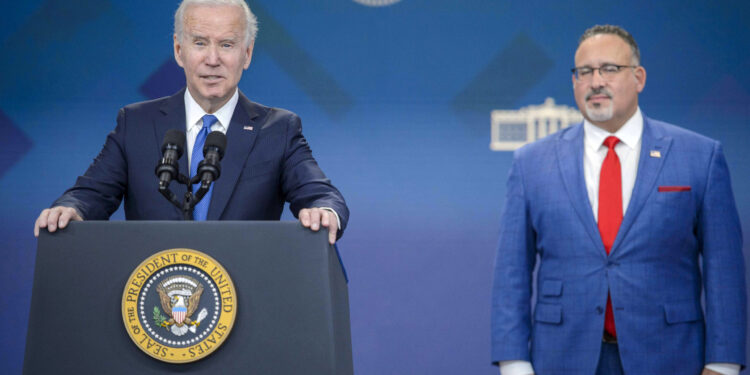A federal judge dismissed a lawsuit on Thursday from six Republican attorneys general against the Biden administration for its policy to cancel $10,000 in student debt for millions of borrowers.
The student loan cancellation plan, forgives up to $10,000 for borrowers who make less than $125,000 a year and up to $20,000 for students who applied for Pell grants, faced a complaint from the state officials, who contended that “no statute permits President Biden to unilaterally relieve millions of individuals from their obligation to pay loans they voluntarily assumed.”
U.S. District Judge Henry Autrey in the Eastern District of Missouri said that his court lacked jurisdiction to hear the case, prompting Nebraska Attorney General Doug Peterson to “seek immediate relief” from the Eighth Circuit Court of Appeals, according to a statement.
The attorneys general objected to the Biden administration’s use of a policy that was intended to grant the Department of Education “specific waiver authority” to ensure relief for “members of the United States military” involved with the conflicts in Iraq and Afghanistan. They likewise pointed to the Supreme Court’s recent opinion in West Virginia v. EPA, which explained that federal agencies cannot assert “highly consequential power beyond what Congress could reasonably be understood to have granted.”
Supreme Court Justice Amy Coney Barrett also rejected an appeal from the Brown County Taxpayers Association, a taxpayers group based in Wisconsin, to challenge the student debt cancellation program. Both losses occurred after the White House unveiled a website by which individuals could request student loan forgiveness. Biden said during a Monday speech that the online application takes “less than five minutes” to finish, noting that more than 8 million people had filed for loan forgiveness “without a glitch” on a beta site launched Friday.
One estimate from the Congressional Budget Office predicts that the overall cost of the loan cancellation could reach $400 billion, raising questions about budgetary impacts. Roughly $360 billion of the total will benefit Pell Grant recipients, who come from low-income households and are more likely to default on their loans, according to an analysis from the Brookings Institution.
Critics of the policy also argue that canceling student debt was no more than an attempt to garner support from Democratic candidates ahead of the upcoming midterm elections. The Pacific Legal Foundation said in a separate legal complaint that the move was an “election year ploy” and does not address the factors behind rising tuition expenses.
Democratic candidates facing difficult midterm campaigns in swing states have nevertheless denounced the policy as progressives attempt to distance themselves from Biden’s particularly poor economic record. One survey from CNBC revealed that 59% of Americans are concerned that eliminating student loan debt will worsen inflation.
“As someone who’s paying off my own family’s student loans, I know the costs of higher education are too high,” Ohio Senate candidate Tim Ryan remarked in a statement. “And while there’s no doubt that a college education should be about opening opportunities, waiving debt for those already on a trajectory to financial security sends the wrong message to the millions of Ohioans without a degree working just as hard to make ends meet.”











